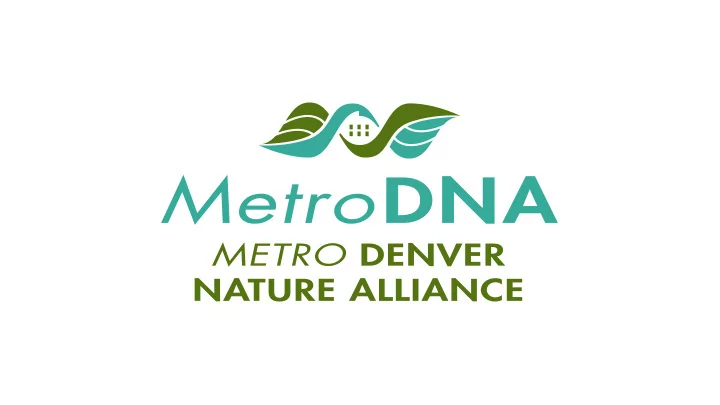

Possible Roles for mDNA Facilitate Collaboration & networking Curate Best ID resources Practices & gaps Advance a Regional Vision Generate Provide resources for Technical community- Assistance based efforts Measure Success
Develop and Advance a Regional Vision • Conservation and Biodiversity Goals • Green Infrastructure Vision • Human Connection/Access to Nature
Connected Parks and Trails
Convene and Connect Communities • Leverage resources • Share ideas and best practices • Coordinate work and increase efficiency
Common communications strategy • Marketing/advertising campaign • Guest blog • Branded trails/open space • Effective use of social media
Measure Progress over Time • Agree on key tasks • Establish Shared Goals • Monitor Agreed-Upon Metrics METRICS (EXAMPLES) • # of people reached • # of acres/trails restored or protected • Water quality or biodiversity measures
Metro DNA Progress to Date • Presented concepts to GOCO Inspire Conference in January • Discovery Process: outreach to stakeholders and focus groups • Planning grant from GOCO • Research on models from around the country • A few pilot/experiments
FEEDBACK Overall Response EXCITEMENT for the mission and vision of Metro DNA Approach and structure is seen as INCLUSIVE and OPEN TO INPUT Both HOPE and CONCERN about whether and how Metro DNA could increase, or strain, the capacity and resources of existing efforts Partners see Metro DNA as a potential way to LEVERAGE their existing work to achieve greater impact
FEEDBACK CONT’D Potential Challenges The current context is COMPETITIVE and alignment of efforts is difficult to achieve Be prepared to address “COLLABORATION FATIGUE,” and be sure to learn from the success and failures of other collaborative efforts Recognize that data and evaluation might be difficult in this context
FEEDBACK CONT’D Other Key Insights Engaging partners takes long-term commitment, persistence, patience Continuous communication is essential, and partners can help The governance structure of the network should use a “form follows function” approach so it serves local needs As data is collected and analyzed in the network, be sure to focus on the story behind the data, not just the numbers themselves
CURRENT STATUS • Focused on VALUE PROPOSITION for partners and community • Developing opportunities for STRATEGIC outreach and engagement • Working on regional GIS DATABASE available to all partners • Researching MODELS from other cities • Exploring ways to set regional GOALS and measure success • Develop a STRATEGIC PLAN this winter
IN THE MEANTIME…. ……SOME FUN PROJECTS!
CanoeMobile
Boys and Girls Club Night at the Botanic Gardens
Pollinator Gardens
MIS ISSION and VISION • Mission: To provide a regional vision and leverage resources to increase the Metro Denver community’s engagement with nearby nature • Vision: Within one generation, the Metro Denver area will be a thriving place for all people and nature
VALUES • Equity: We believe all people, regardless of neighborhood and resources, deserve to have equitable access to nature • Thrivability : We are passionate about a thriving future for people and nature • Science: We objectively gather data, build on expertise and openly share both to drive action • Collaboration: We foster collaboration, authentic community engagement and ongoing communication to empower people and communities to act
RESULTS and IN INDICATORS • Results: The conditions of well-being we want for our children, families and the community as whole. • Indicators : How we measure these conditions. From Mark Friedman, Trying Hard is Not Enough
RESULTS and IN INDICATORS Result: All people in Metro Denver have access to quality natural spaces. Indicators: • % of people within a 10 minute walk to nearby nature • Safety (crime rate)
RESULTS and IN INDICATORS Result: The metro Denver region supports a healthy and connected natural system. Indicators: • Functional ecosystem (includes number and acreage of natural habitat – e.g. prairie, etc. and number or % of native/good species) • Tree canopy • Species assemblage • Green infrastructure • Pending further review by Nature Conservancy team to refine and offer a clearer definition
RESULTS and IN INDICATORS Result: All people in Metro Denver are engaged and invested in nearby nature. Indicators: Care (depth of connection) about nature, essential value of nature Usage rates of nature Economic benefit
THE TASK Objective: To gather input on how well the Results and Indicators help provide a shared set of goals for Metro DNA partners Activity: • Rotate through 3 rounds of discussion, visiting each of the 3 Results Tables • Group share out of discussion highlights • 4 th Round discussion of Equity Lens
NEXT STEPS Next Week: Distribute survey to broader stakeholder network September 8: Technical workshop to review feedback on Results and Indicators and define the next steps in data collection for Metro DNA This fall: Continued stakeholder outreach to inform next steps for Metro DNA January 2017: Strategic planning process begins
Recommend
More recommend